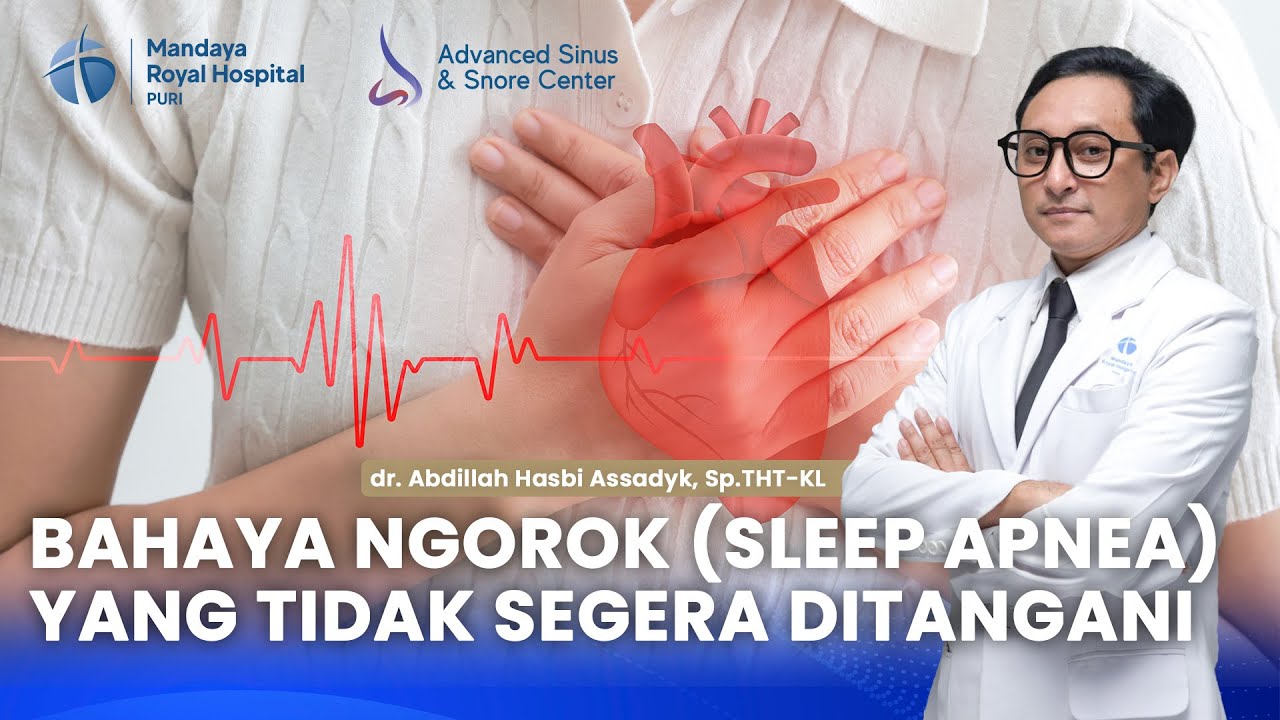Snoring is often considered a normal and harmless habit. However, it can actually indicate an underlying medical condition that requires attention — one of which is sleep apnea, a disorder characterized by repeated pauses in breathing during sleep. If left untreated, chronic snoring can lead to serious health problems.
ENT specialist at Mandaya Royal Hospital Puri, dr. Abdillah Hasbi Assadyk, Sp.THT-KL, explains the dangers of untreated snoring and how it can affect your long-term health.
Contents
dr. Abdillah’s Explanation on the Dangers of Snoring

According to dr. Abdillah, snoring may not cause an immediate medical emergency, but its long-term effects can be very harmful to health.
“It’s not dangerous in an emergency sense, but it definitely disturbs your sleep because you tend to wake up frequently. In the end, if sleep apnea is present, the quality of your sleep will be greatly affected,” explained dr. Abdillah.
When a person snores—especially if accompanied by airway obstruction (sleep apnea)—the body repeatedly wakes up without realizing it. This disrupts deep sleep and prevents the body from achieving optimal rest.
Over time, this condition can lead to several health complications, such as:
- Hypertension (high blood pressure) due to repeated pressure spikes.
- Heart rhythm disorders (arrhythmia) or other cardiovascular diseases.
- Excessive daytime sleepiness from poor sleep quality.
- Decreased concentration and alertness.
- Cognitive problems, such as difficulty focusing and mental fatigue.
dr. Abdillah further explains that chronic snoring can develop into a condition known as Obstructive Sleep Apnea Syndrome (OSAS).
“It becomes a condition called a syndrome—we call it Obstructive Sleep Apnea Syndrome, or OSAS for short,” said dr. Abdillah.
This syndrome needs proper medical treatment because it can significantly affect the cardiovascular system and brain function if left untreated.
Advanced Snoring Treatment at Mandaya Royal Hospital Puri
To treat snoring caused by sleep apnea, Mandaya Royal Hospital Puri offers an advanced medical technology called Quantum Molecular Resonance (QMR).
This procedure is performed by dr. Abdillah, who has completed intensive training at Centro Businco, Italy—a leading ENT center in Europe and worldwide.
QMR is a state-of-the-art medical technology commonly used in minimally invasive surgical procedures, including the treatment of sleep apnea. It uses high-frequency electromagnetic waves to cut or open tissue with extreme precision, without damaging surrounding healthy cells.
In sleep apnea management, QMR functions to:
- Reduce excess tissue in the throat or soft palate that causes airway blockage.
- Open the airway so air can flow more freely during sleep.
- Minimize tissue trauma thanks to small incisions and low thermal effect.
The frequency used in QMR procedures ranges between 4–16 MHz, which helps shrink nasal tissues without generating excessive heat. The technology also works selectively on mucosal tissue and promotes healthy tissue regeneration.
QMR procedures are quick and efficient, typically taking only 15–20 minutes, allowing patients to feel comfortable without long hospitalization.
Advantages of QMR for Treating Snoring and Sleep Apnea
Compared to conventional methods, QMR offers several key advantages for patients suffering from snoring or sleep apnea:
- Non-invasive procedure – performed without large incisions, making it safer and with minimal risk.
- Faster recovery – patients can usually resume activities within 3–5 days, much shorter than the 10–14 days required for conventional surgery.
- Minimal bleeding and pain – surrounding tissue remains well-preserved.
- Improved sleep quality – airways open wider, allowing smoother breathing and deeper sleep.
- High effectiveness – proven to work for patients with mild to moderate OSA.
With QMR therapy, patients who previously depended on CPAP (Continuous Positive Airway Pressure) devices may no longer need to rely on them long-term.
While CPAP machines help by providing continuous positive air pressure through a mask to keep airways open, many patients find them uncomfortable for prolonged use. The modern QMR approach offers a more comfortable, safe, and effective alternative to manage sleep apnea without dependence on sleep-assist devices.
dr. Abdillah’s Consultation Schedule at Mandaya Royal Hospital Puri
You can meet dr. Abdillah Hasbi Assadyk, Sp.THT-KL at Mandaya Royal Hospital Puri on:
- Monday: 08.00 – 12.00 & 16.00 – 20.00 WIB
- Tuesday: 08.00 – 12.00 & 16.00 – 20.00 WIB
- Wednesday: 08.00 – 12.00 & 16.00 – 20.00 WIB
- Thursday: 08.00 – 12.00 & 16.00 – 20.00 WIB
- Friday: 08.00 – 12.00 & 16.00 – 20.00 WIB
- Saturday: 08.00 – 20.00 WIB
To schedule a QMR procedure with dr. Abdillah at Mandaya Royal Hospital Puri, use the Chat via WhatsApp, Book Appointment feature, or the Care Dokter app—available on Google Play and the App Store—to check your queue number, manage visits, and access complete information.
Source: dr. Abdillah Hasbi Assadyk, Sp.THT-KL



